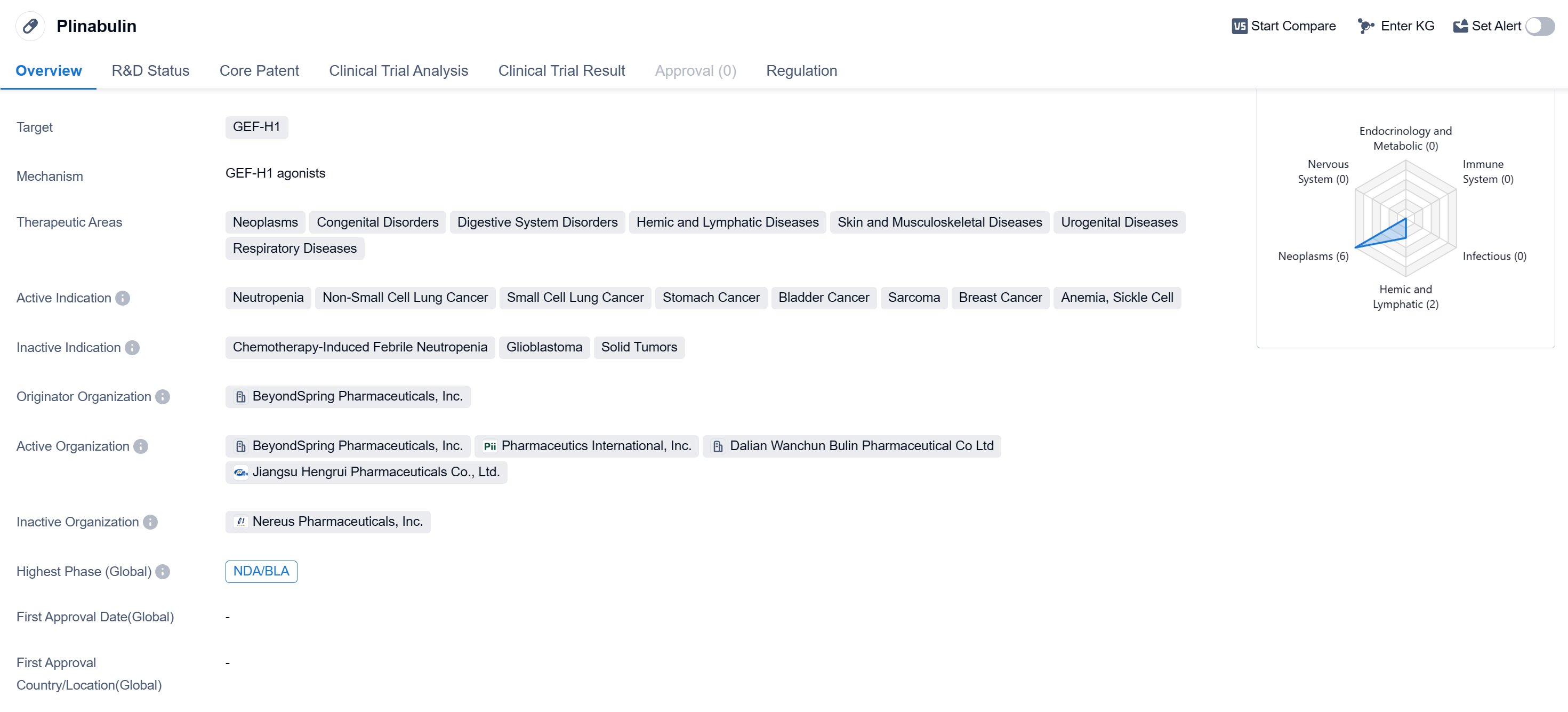Pharmaceutical Insights: Plinabulin's R&D Progress and its Mechanism of Action on Drug Target
Plinabulin's R&D Progress
Plinabulin is a small molecule drug developed by BeyondSpring Pharmaceuticals, Inc. It is designed to target GEF-H1, a protein involved in various cellular processes. The drug has shown potential therapeutic benefits in multiple therapeutic areas, including neoplasms, congenital disorders, digestive system disorders, hemic and lymphatic diseases, skin and musculoskeletal diseases, urogenital diseases, and respiratory diseases.
Plinabulin has been specifically indicated for the treatment of neutropenia, a condition characterized by low levels of neutrophils, a type of white blood cell. Additionally, it has shown promise in the treatment of various types of cancer, including non-small cell lung cancer, small cell lung cancer, stomach cancer, bladder cancer, sarcoma, breast cancer, and anemia related to sickle cell disease.
The drug has reached the highest phase of development globally, known as NDA/BLA. Plinabulin has also received special regulatory designations, including priority review, breakthrough therapy, and special review project. These designations highlight the potential of the drug to address unmet medical needs and expedite the regulatory process
As a small molecule drug, Plinabulin offers several advantages in terms of formulation, manufacturing, and delivery. It is likely to have a well-defined chemical structure, allowing for easier synthesis and quality control. This can contribute to a more efficient production process and potentially lower manufacturing costs.
👇Please click on the image below to directly access the latest data (R&D Status | Core Patent | Clinical Trial | Approval status in Global countries) of this drug.
Mechanism of Action for Plinabulin: GEF-H1 agonists
GEF-H1 agonists are substances or compounds that activate or stimulate the GEF-H1 protein. GEF-H1 stands for Guanine nucleotide Exchange Factor-H1, which is a protein involved in cellular signaling pathways. From a biomedical perspective, GEF-H1 is known to play a crucial role in regulating cell migration, cell division, and cell adhesion.
When GEF-H1 agonists bind to the GEF-H1 protein, they induce a conformational change that leads to the activation of GEF-H1. This activation triggers downstream signaling events, ultimately influencing cellular processes. By targeting GEF-H1, agonists can modulate cell behavior and potentially have therapeutic applications.
It is important to note that the specific functions and effects of GEF-H1 agonists may vary depending on the context and the specific cellular processes being targeted. Further research and studies are needed to fully understand the potential applications and implications of GEF-H1 agonists in biomedicine.
Drug Target R&D Trends for Plinabulin
According to Patsnap Synapse, as of 15 Sep 2023, there are a total of 1 GEF-H1 drugs worldwide, from 5 organizations, covering 12 indications, and conducting 20 clinical trials.
The analysis of target GEF-H1 reveals that BeyondSpring, Inc. and Wanchun Life Technology (Dalian) Co., Ltd. are the fastest-growing companies in terms of drug development. The highest stage of development for GEF-H1 drugs is NDA/BLA, with several indications being targeted, including Neutropenia, Non-Small Cell Lung Cancer, and Small Cell Lung Cancer. Small molecule drugs are progressing rapidly, indicating potential competition in the market. The United States and China are the leading countries in the development of GEF-H1 drugs, with other countries also making progress. Overall, the competitive landscape for GEF-H1 drugs is diverse, with potential for future development and competition.
👇Please click on the picture link below for free registration or log in directly if you have a freemium account, you can browse the latest research progress on drugs, indications, organizations, clinical trials, clinical results, and drug patents related to this target
Conclusion
In summary, Plinabulin is a small molecule drug developed by BeyondSpring Pharmaceuticals, Inc. that targets GEF-H1. It has shown promise in various therapeutic areas, particularly in the treatment of neutropenia and different types of cancer. With its advanced development stage and special regulatory designations, Plinabulin has the potential to address unmet medical needs and provide significant benefits to patients.






